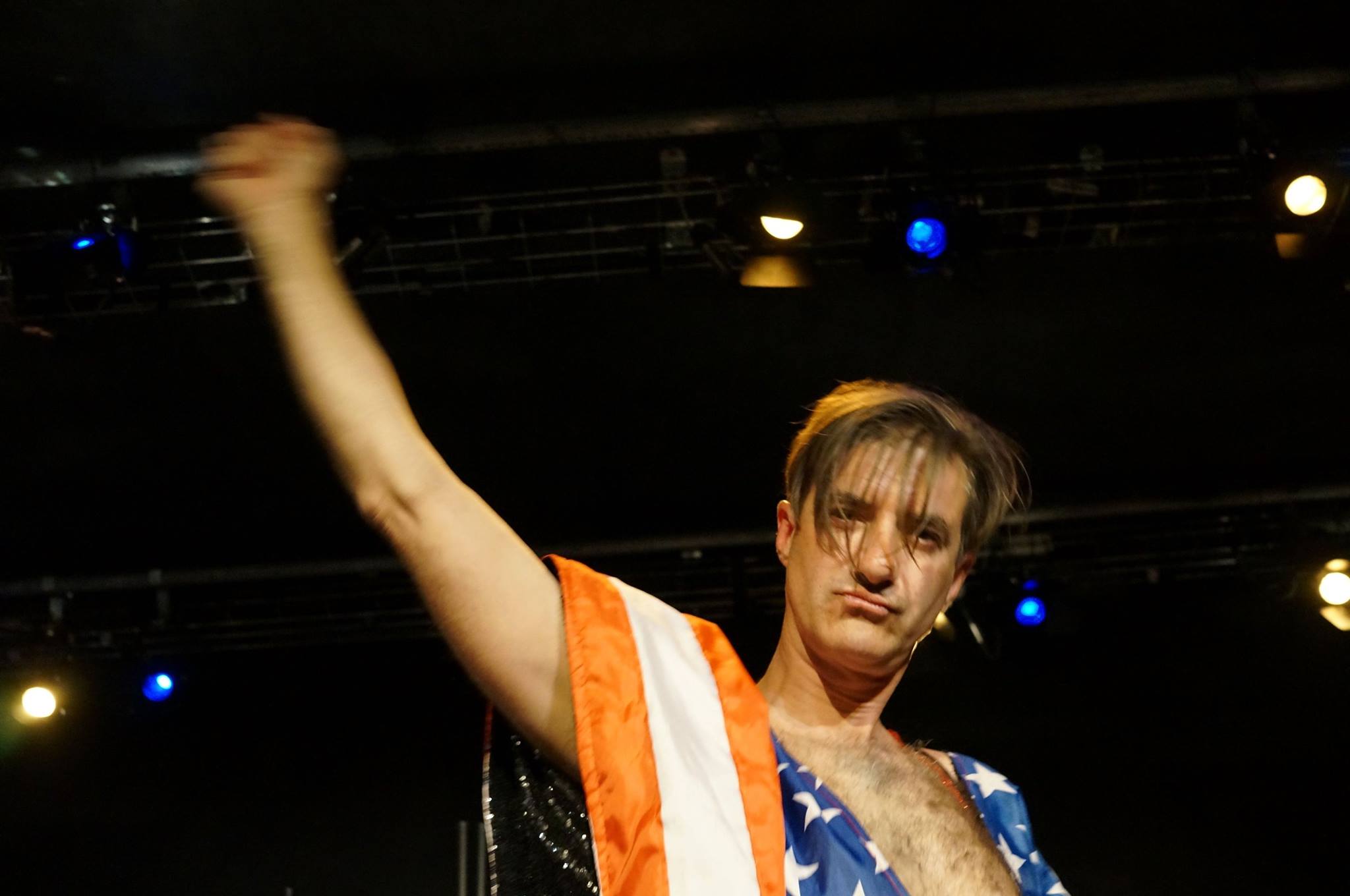‘This is a true story. In the early 90s in Chicago, I fell in love with a man who was running for president – in a dress.’
George Orange’s entertaining and engaging autobiographical show starts with an entrance from the rear – ooh missus – as our George slides quietly into the auditorium and then dances and pouts and poses as he slinks along the wall leading him to the stage area, flirting outrageously with men and women as he goes. He’s wearing matt silver plastic trousers, an odd-bod 1990s ravers’ jacket and a Joan Jett Blakk T-shirt. Joan Jett Blakk is the man who who was the candidate for the Queer Nation Party against George Bush in the 1992 presidential contest, fighting on the ‘Lick Bush in 92’ ticket. People born after 1992 who aren’t too hot on history: Bush won. America didn’t get a black, gay, cross-dressing president who saw himself as a blend of Divine, David Bowie and Grace Jones.
George tells us near the start that he is bisexual. There’s an interesting little monologue on whether you are what you are in this very moment – which for him right now, is a man in a monogamous heterosexual relationship – or whether you are always ‘bi’ even if not actively bedding people of both sexes. I’m with you George – it’s a question I’ve asked myself many times, and an aspect of queer identity that isn’t talked about anywhere near enough.
Having introduced himself and where he’s at, we launch into the story at the heart of the show: his relationship with Terence Smith aka Joan Jett Blakk. George at this time is ‘questioning’ but hasn’t actually slept with a man. He’s had a number of girlfriends and understands how all that works, but when it comes to boy sex, he’s afraid of appearing innocent and naive to Terence – although the older and wiser George looking back realises that his ‘boy virginity’ would probably have had massive appeal. But then, aged 22, a countryside boy straight from a farm, he was terrified of looking like he didn’t know what he was doing, so he slept with a male friend just to get the virginity thing over and done with. We are taken through the early days of their relationship (once it gets going), alongside parallel stories of friendships and flatmates in the gay scene in Chicago in the early 1990s. The absent character, Terence/Blakk, is drawn lovingly: we see him as a waiter lusted after by the young George; we are with George and Terence through the story of the presidential campaign; and we feel the heartbreak when Terence moves off to San Francisco, but George can’t go with him for family reasons. Blakk’s politics are portrayed through a sharing of his fabulous manifesto pledges, one of which was a switching of the Education budget with the Defence budget. Just think, says George channelling Blakk: the schools would have books, and the military would have to hold cake bakes to raise the money for their weapons.
The show is very nicely structured and the material is always fascinating. There’s a lot of wryly comic looking-back-at-a-younger-self telling of amusing anecdotes mixed in with a number of harrowing stories about AIDS/HIV and the murder of gay men. He frequently draws the audience into the action, and there is disco dancing and a bit of drag. There is even some mime…
The thing that lets the show down a bit is the delivery of some of the verbal storytelling. A little odd, as George is a seasoned performer, with 25 years behind him as a mime, clown, actor, dancer, and founder of Mary Bijou Cabaret who created Hitch, the magnificent circus-cabaret tribute to Alfred Hitchcock.
But not odd when you think about the enormous task that is writing and delivering a complex script based on your own autobiographical material. If this show has a director, s/he isn’t credited anywhere – so I’m going to assume it hasn’t and say that this is what it needs. It needs someone outside of this magnificent story to hold the space for George. It is almost an impossible task to do this for yourself when dealing with your own life story.
This is a fabulous show in the making, exploring a vital chapter in queer history. It feels close to made, but not quite there yet. It’ll get there, and it will be DIVINE, darling.

